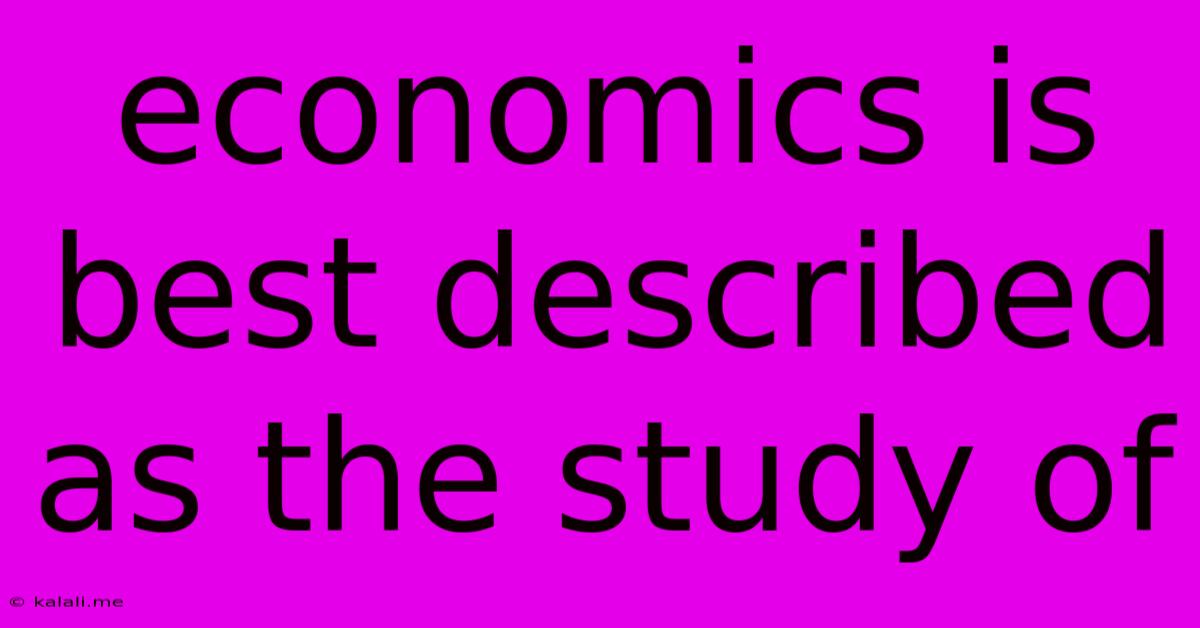Economics Is Best Described As The Study Of
Kalali
Jun 14, 2025 · 3 min read

Table of Contents
Economics is Best Described as the Study of: Scarcity and Choice
Economics, at its core, is the study of scarcity and the choices we make as a result. It's not just about money, although money plays a significant role. It's a social science that analyzes how societies allocate their limited resources to satisfy unlimited wants and needs. This fundamental concept influences every aspect of our lives, from individual decisions to global policies. This article will delve deeper into this definition, exploring its key components and implications.
This article will explore the core principles of economics, including scarcity, choice, opportunity cost, and the various branches of economics. It will also touch upon the impact of economic decisions on individuals, businesses, and society as a whole.
Understanding Scarcity: The Foundation of Economics
The very essence of economics lies in the concept of scarcity. Resources, whether they are natural resources like land and minerals, labor, capital (machinery, tools, factories), or even time, are finite. Our wants and needs, however, are virtually limitless. This fundamental imbalance – limited resources versus unlimited wants – is what drives economic activity. Because resources are scarce, we must make choices about how to allocate them.
Choice: The Inevitable Consequence of Scarcity
Since resources are scarce, every economic decision involves a choice. We must constantly weigh the benefits and costs of different options. Choosing one thing inevitably means giving up something else. This leads us to the crucial concept of opportunity cost.
Opportunity Cost: The Value of What You Give Up
Opportunity cost is the value of the next best alternative forgone when making a choice. It's not just the monetary cost, but also the potential benefits you missed out on by choosing a different option. For instance, the opportunity cost of spending an afternoon at the beach might be the income you could have earned by working. Understanding opportunity cost is critical for rational decision-making in all aspects of life.
The Branches of Economics: Micro and Macro
The field of economics is broadly divided into two main branches:
-
Microeconomics: This branch focuses on the behavior of individual economic agents, such as consumers, firms, and industries. It examines how they make decisions, interact in markets, and determine prices. Topics include supply and demand, market structures, consumer behavior, and production costs.
-
Macroeconomics: This branch deals with the economy as a whole. It analyzes aggregate economic indicators like inflation, unemployment, economic growth, and government policies designed to influence these indicators. Key concepts include Gross Domestic Product (GDP), monetary policy, fiscal policy, and international trade.
Beyond the Basics: The Broader Implications
The study of economics extends far beyond the simple interaction of supply and demand. It explores complex interactions within and between societies. It considers:
- Economic Systems: Different societies have adopted various economic systems, such as capitalism, socialism, and mixed economies, each with its unique approach to resource allocation.
- Economic Inequality: Economics studies the distribution of wealth and income within a society and the factors that contribute to inequality.
- Economic Growth and Development: Understanding the factors that drive economic growth and development is crucial for improving living standards around the world.
- Environmental Economics: This emerging field examines the economic implications of environmental issues and explores solutions for sustainable development.
- Behavioral Economics: This field incorporates psychological insights into economic decision-making, acknowledging that individuals don't always behave rationally.
In conclusion, economics is best described as the study of how societies allocate scarce resources to satisfy unlimited wants and needs. This fundamental concept underpins all economic activity and has far-reaching implications for individuals, businesses, and governments alike. Understanding the core principles of scarcity, choice, and opportunity cost is crucial for navigating the complexities of the modern world. The diverse branches of economics provide a comprehensive framework for analyzing and addressing economic challenges at both micro and macro levels.
Latest Posts
Latest Posts
-
Which Literary Device Is Used In The Following Sentence
Jun 14, 2025
-
An Increase In The Number Of Cells Is
Jun 14, 2025
-
Can You Change Sat Test Date
Jun 14, 2025
-
How To Remove Static Electricity From Machinery
Jun 14, 2025
-
Who Wrote The Bhagavad Gita Book
Jun 14, 2025
Related Post
Thank you for visiting our website which covers about Economics Is Best Described As The Study Of . We hope the information provided has been useful to you. Feel free to contact us if you have any questions or need further assistance. See you next time and don't miss to bookmark.